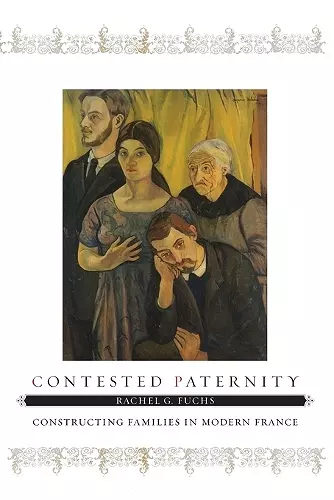Contested Paternity
Constructing Families in Modern France
Format:Paperback
Publisher:Johns Hopkins University Press
Published:29th Oct '10
Currently unavailable, and unfortunately no date known when it will be back
This paperback is available in another edition too:
- Hardback£43.65was £48.50(9780801888328)

A masterpiece in French social, cultural, and gender history. A sweeping account of a crucial but neglected subject, Contested Paternity gets to the heart of the issues that dominate modern French history-above all the tension between a revolutionary and a counterrevolutionary political culture and the long transition from a culture organized around the patriarchal family to one organized around the ungendered individual. -- Lenard Berlanstein, University of Virginia In this richly-documented study, Rachel Fuchs opens up a new window into the history of families by perceptively examining the legal and customary ways that paternity was negotiated in French society from the old regime to the present. This angle of approach yields extraordinary insights into the evolution of fatherhood, women's changing legal status, and children's rights and shows us convincingly how the family changed from a biological unit which admitted no outsiders, to a fluid, social institution that effectively satisfies the needs of all its members, no matter what their blood relationships. The way this development unfolded in both custom and law is told here with clarity, scrupulous attention to detail, and often dramatically pertinent illustrations drawn from, correspondence, trials, and landmark jurisprudence. -- Robert A. Nye, Oregon State University
Focusing on paternity as a category of family history, Contested Paternity emphasizes the importance of fatherhood, the family, and the law within the greater context of changing attitudes toward parental responsibility.This groundbreaking study examines complex notions of paternity and fatherhood in modern France through the lens of contested paternity. Drawing from archival judicial records on paternity suits, paternity denials, deprivation of paternity, and adoption, from the end of the eighteenth century through the twentieth, Rachel G. Fuchs reveals how paternity was defined and how it functioned in the culture and experiences of individual men and women. She addresses the competing definitions of paternity and of families, how public policy toward paternity and the family shifted, and what individuals did to facilitate their personal and familial ideals and goals. Issues of paternity and the family have broad implications for an understanding of how private acts were governed by laws of the state. Focusing on paternity as a category of family history, Contested Paternity emphasizes the importance of fatherhood, the family, and the law within the greater context of changing attitudes toward parental responsibility.
Fascinating in every particular... One of the most important aspects of Contested Paternity is the way in which Fuchs uses the history of paternity suits as a way to analyze changing attitudes towards fatherhood, motherhood, and childhood. -- Jean Elisabeth Pedersen H-France 2009 A compelling study that examines the epochal shift in French fatherhood over the past two centuries. -- Kristen Stromberg Childers American Historical Review 2009 Accessible and of interest to readers from a variety of disciplines and interdisciplinary junctures. -- Sylvia Schafer Clio 2009 Through her comprehensive study of paternity suits and the impact of banning them from 1804 and 1812, Rachel Fuchs has produced a tour de force on the history of family law in France from the eighteenth century to modern times. -- Maire Fedelma Cross French Studies 2010 [Fuchs] effectively links battles over paternity and parental responsibility to wider political developments... highly recommended. Choice 2009 Fuchs's treatment of the theme of constructions of paternity is stimulating, clear and yet highly refined... With her considerable methodological expertise as a social historian of France, she weaves an exceedingly colourful picture of disputes around paternity. French History 2010 The cases that Fuchs presents are fascinating. -- Caroline Ford Journal of Interdisciplinary History 2010 This book's scope and framework make it a significant addition to the history of families in modern France. -- Deborah Houk Schocket Dalhousie French Studies 2009 Fuch's book provides us with an excellent guide to understanding how these legal notions originated and how they have evolved in modern French history. -- Camille Robcis Social History 2010 In this splendid study, Rachel Fuchs takes an entirely new angle on gender history... On completing the book, all historians will say as I did, 'I wish I'd thought of that.' Fuchs not only thought of it; she did it and did it very well indeed. -- Charles Sowerwine H-France 2009 Has taken a difficult and neglected subject and opened up its many complexities in a way in which no other work I can think of comes close. -- Sian Reynolds H-France 2009 This is a wonderful book, which balances aspects of social, cultural, legal, and gender history. One of its many strengths is Fuchs's ability to combine vivid individual stories with broad analysis. She has carefully sampled judicial archives and the legal press to unearth the concerns and struggles of particular women and men. But she also gives a compelling story of changes in both ideas and laws over the sweep of two centuries. She demonstrates convincingly that the seemingly small question of recherche de paternite can illuminate fundamental social and cultural transformations. -- Gerard N. Magliocca Journal of Law and History Review 2010
- Winner of American Historical Association J. Russell Major Prize 2009 (United States)
- Winner of Frances Richardson Keller: Sierra Prize 2009 (United States)
- Winner of Charles E. Smith Award 2008 (United States)
ISBN: 9780801898334
Dimensions: 235mm x 156mm x 24mm
Weight: 522g
368 pages